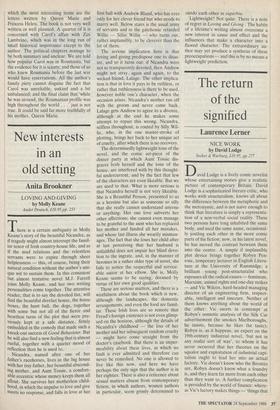New interests in an old setting
Anita Brookner
LOVING AND GIVING by Molly Keane
Andre Deutsch, f10.95,pp. 233
There is a certain ambiguity in Molly Keane's story of the beautiful Nicandra, as if tragedy might almost interrupt the famil- iar tenor of Irish country-house life, and as if the mad relations and the relentless servants were to expire through sheer helplessness — this, of course, being their natural condition without the author's uni- que wit to sustain them. In this consistent but almost tentative novel M.J. Farrell joins Molly Keane, and her two writing personalities come together. The attentive reader, that is to say the devoted fan, will find the beautiful derelict house, the horse boxes, the hunt ball, the dogs, together with some but not all of the fierce and heartless turns of the plot that were pre- viously kept at a safe distance, firmly embedded in the comedy that made such a knock-out success of Good Behaviour. But he will also find a new feeling that is almost rueful, together with a quieter mood of reflection than he is used to.
Nicandra, named after one of her father's racehorses, lives in the big house with her tiny father, her beautiful abscond- ing mother, and Aunt Tossie, a comfort- able eccentric whose money keeps them all afloat. She survives her motherless child- hood, in which the impulse to love and give meets no response, and falls in love at her first ball with Andrew Bland, who has eyes only for her clever friend but who needs to marry well. Below stairs is the usual army of servants and in the gatehouse retarded Willie — Sillie Willie — who turns out, rather implausibly, to be cleverer than the lot of them.
The serious implication here is that loving and giving predispose one to disas- ter, and so it turns out: if Nicandra were not so transparently devoted, then Andrew might not stray, again and again, to the wicked friend, Lalage. The other implica- tion is that in love it pays to be ruthless, or rather that ruthlessness is there to be used, however noble one's character, when the occasion arises. Nicandra's mother ran off with the groom and never came back. Lalage gets Andrew to agree to a divorce, although at the end he makes some attempt to repair this wrong. Nicandra, selfless throughout, is routed by Silly Wil- lie, who, in the one master-stroke of plotting, brings her back to her unique act of cruelty, after which there is no recovery.
The determinedly lightweight tone of the novel, and the comic set-piece of the dinner party at which Aunt Tossie dis- graces both herself and the tone of the house, are interfered with by this thought- ful undercurrent, and by the fact that few of the characters are even likeable. But we are used to that. What is more serious is that Nicandra herself is not very likeable. She is a Beautiful Person, presented to us as a heroine but also as someone so silly that she really cannot understand anyone or anything. Her one love subverts her other affections; she cannot even manage to be grateful to the aunt who has replaced her mother and funded all her mistakes, and whose last illness she wearily misman- ages. The fact that she loses her child after at last perceiving that her husband is unfaithful does not impair her blind devo- tion to the ingrate, and, in the manner of heroines in a rather older type of novel, she fails to notice the respectful and service- able suitor at her elbow. She is, Molly Keane seems to be saying, doomed by virtue of her own good qualities.
These are serious matters, and there is a wistfulness about the book which is new, although the landscapes, the domestic arrangements, and even the food are famil- iar. These Irish lives are so remote that Freud's foreign existence is not even glimp- sed on the horizon, although the details of Nicandra's childhood — the loss of her mother and her subsequent random cruelty — might have come straight from the doctor's casebook. But there is an imper- meability about these lives, in which no fault is ever admitted and therefore can never be remedied. No one is allowed to live like this now, and here we have perhaps the only sign that the author is in her eighties. There is also a reticence about sexual matters absent from contemporary fiction, in which authors, women authors in particular, seem grimly determined to
outdo each other in superbia.
Lightweight? Not quite. There is .a note of regret in Loving and Giving . The habits of a lifetime's writing almost overcome a new interest in cause and effect and the influences that make a character into a flawed character. The extraordinary au- thor may yet produce a synthesis of these preoccupations — and this is by no means a lightweight prediction.






























































 Previous page
Previous page